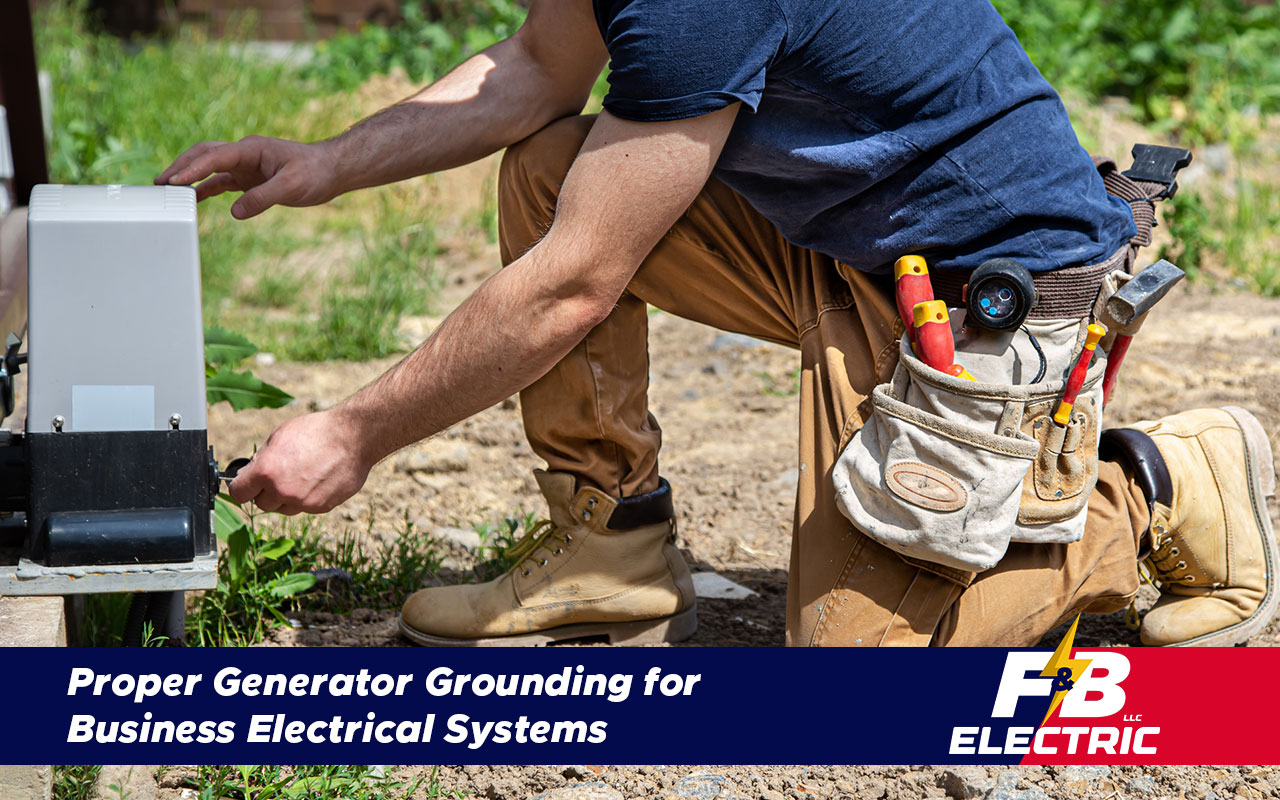
When installing a commercial generator, one of the most important—but often overlooked—steps is proper generator grounding. This step ensures safe operation, prevents dangerous electrical faults, and keeps your system compliant with national and local codes.
At F&B Electric LLC, we help Maryland businesses install reliable backup power systems that include correct grounding for long-term safety. Whether your business is small or large, grounding is essential for the performance and protection of your generator setup.
Why Grounding Matters in Commercial Systems
Prevents Shock and Fire Hazards
Grounding provides a safe path for stray electrical current to flow into the earth. Without it, a fault in the generator wiring can energize metal parts and create serious shock or fire hazards. This is especially important in commercial environments where equipment, customers, and employees may all be affected by electrical failures.
Code Compliance Is Non-Negotiable
The National Electrical Code (NEC) and Maryland’s local regulations require grounding for all permanently installed generators. These codes specify how grounding conductors, electrodes, and bonding connections must be installed. Failure to meet these standards can lead to failed inspections, system failure, or safety risks.
What Proper Generator Grounding Involves
A safe and compliant grounding system includes several components:
- Grounding electrode system: Connects the generator frame to a grounding rod or grid buried in the earth.
- Grounding electrode conductor (GEC): A copper or aluminum wire that links the generator to the grounding electrode.
- Bonding connections: Ensure all metal components of the generator and connected systems are at the same electrical potential.
- Neutral-to-ground connection: Required in some setups depending on whether the generator is a separately derived system.
Each element must be sized, placed, and installed correctly to avoid risk and meet inspection standards.
Backup Generator Wiring for Businesses: Don’t Skip Grounding
In commercial setups, backup generator wiring for businesses isn’t complete without proper grounding. Ground faults or lightning strikes can create serious issues if current has no path to safely discharge. Grounding also helps stabilize voltage during normal operation, protecting your sensitive equipment and extending the life of your system.
Generators connected to transfer switches or panels must be grounded according to system design. This is especially true in multi-unit buildings, facilities with rooftop generators, or complex electrical infrastructures.
FAQs – Proper Generator Grounding
Does every generator need to be grounded?
Yes. All commercial generators, whether standby or portable, must be grounded to meet code and protect users. For professional service, contact F&B Electric LLC or call (443) 857-3579 today.
What happens if a generator isn’t grounded properly?
Improper grounding can lead to electric shock, damaged equipment, and fire hazards. It also results in failed inspections or liability issues. Protect your business by reaching out to F&B Electric LLC or calling (443) 857-3579.
Can I ground a generator myself?
No. Grounding should always be done by a licensed electrician who understands commercial code requirements and system design. Trust the experts at F&B Electric LLC or speak to us directly at (443) 857-3579.
Keep Your Business Safe with Proper Generator Grounding
Grounding isn’t just a technical requirement—it’s a vital part of protecting your business from electrical risks. When done correctly, it ensures that your generator system works reliably and safely for years to come.
F&B Electric LLC installs commercial generators across Maryland with expert grounding and backup wiring that meets the highest standards. Contact us today to schedule an inspection or call (443) 857-3579 for expert service.
